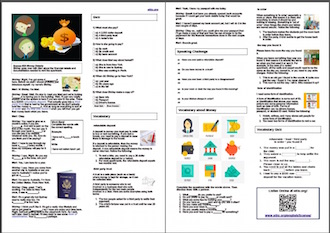Money Details
Shirley goes over with Mari about the financial details and documentation needed to rent the apartment.
Shirley: Right, I’ve got some documents here. Before we start I should probably just introduce myself: my name’s Shirley.
Mari: Hi Shirley, I’m Mari.
Shirley: Great. Well, it’s nice to meet you Mari and we’re looking forward to having you in the building. Well, I’ll just very briefly explain what the system is here if you are new to the area.
There is a $2000 refundable deposit. That actually goes into a third party trust that is held by the government so we don’t actually hold the money ourselves. And as long as everything is sort of in order and the way you found it when you left then you get that money back when you leave.
Mari: Okay.
Shirley: You need to give us a month’s notice if you are leaving.
Mari: Uh huh.
Shirley: And rent is paid on the first of the month. You can pay it through your bank account or you can pay it by cheque, whatever suits you. So, how do you think you’d be paying?
Mari: I hope to pay through my bank account every month. I think my company will pay for it so...
Shirley: I see. Right. So you are working in the area, are you?
Mari: Yes, I am here for a year.
Mari Goes to Australia
Part 1: Any Vacancies?
Part 2: About the Apartment
Part 3: Money Details
Part 4: Getting Connected
Part 5: Quiet Foo-foo!
Part 6: Dinner
Part 7: Leaving
Shirley: I see. Have you come from another city in Australia or are you new to Australia? I notice you’ve got an accent.
Mari: I’m new to Australia. I’m from the United States. From New York.
Shirley: Okay, great. That’s exciting. I’ve been to New York once, it was wonderful.
Mari: It’s a great city but Sydney seems really nice too. I’m excited to live here.
Shirley: I think you’ll like it. It’s got a really nice lifestyle and we’ve got great weather so I hope you enjoy your time here. Right, well just getting back to the paperwork here. As I said, we’ll also need a deposit. I’ll also need to see some form of identification. You passport perhaps.
Mari: Yeah, I have my passport with me today.
Shirley: Great! And have you already opened bank accounts because if I could get your bank details today that would be great.
Mari: I haven’t opened my bank account yet, but I will do it in the next couple of days.
Shirley: Okay so...well if you could give me your passport then I’ll go make a copy of that and then we can arrange to do the paperwork for the financial transactions done in the next couple of days.
Mari: Sounds great.
Shirley: Okay!
refundable deposit

A deposit is money one must pay in order to buy or rent something. If you rent a house, you need to pay a deposit in case there is damage to the house.
If a deposit is refundable, then the money is returned to the person making the deposit. A non-refundable deposit means the money is never returned. Notice the following:
- To rent a bike, you need to pay a 20 dollar refundable deposit for a helmut.
- For most apartments, the refundable deposit equals two months rent.
third party trust

A trust is a safe place (such as a bank) where money is kept for storage, so it can be collected later.
A third party is someone who is not involved in a business deal who acts independently for the two main people involved in a deal. Here are some examples using both terms:
- The two people asked for a third party to settle their argument.
- The child's fortune was put in a trust until he was 20 years old.
in order

When something is 'in order' especially a room or place, that means it is clean and everything is where it should be and nothing is missing.
Something is 'out of order' when things like chairs and tables are moved around. Notice the following:
- The teachers makes the students put the room back in order before they leave.
- After the party, it took awhile to get the house back in order.
the way you found it

Please leave the room the way you found it.
When you leave something they way you found it, that means it is exactly the same as when you first used it or saw it.
For example, in the case of a rented apartment, all the walls and carpet would need to be the same as the day you moved in, or you need to pay extra charges. Notice the following:
- This is an old gun I found in the woods. It looks now just the way I found it. I've never cleaned it.
- This room is not the way I left it. Who messed it up?
form of identification

I need some form of identification.
A form of identification is some sort of ID, or identification that shows your name, picture and some personal information such as date of birth.
Forms of identification can be drivers license, passport, or student ID card. Notice the following:
- Hotels, airlines, and many stores ask people for some form of identification.
- You need two forms of identification to rent a car.
Keep Listening
Here are some more great lessons!
Vocabulary Challenge
in order • you found it










